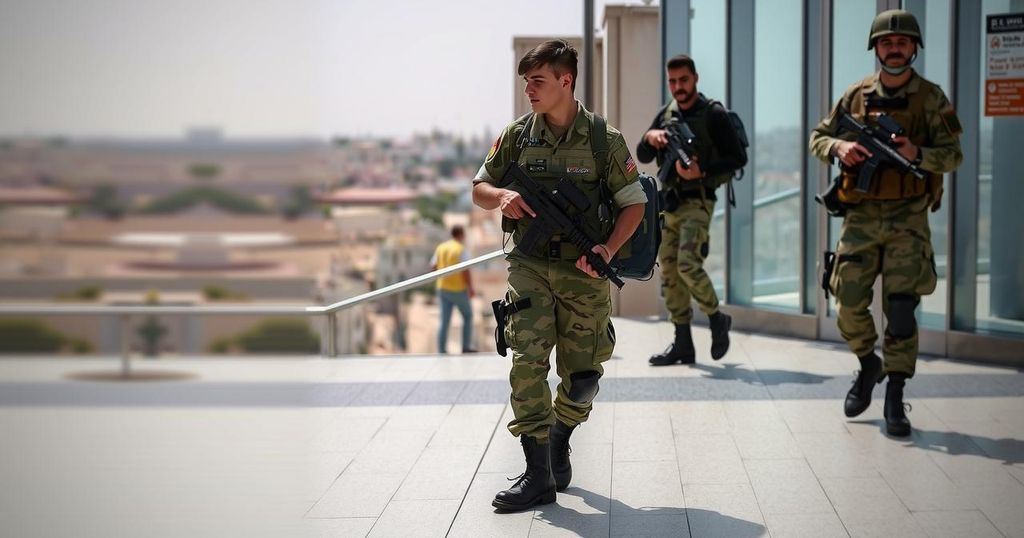Israeli Soldiers Face Legal Challenges Abroad Amid Growing War Crime Allegations

The article discusses the rising legal risks faced by former Israeli soldiers abroad, particularly following a lawsuit in Brazil alleging war crimes related to their Gaza service. The Hind Rajab Foundation is spearheading these legal actions, holding individual soldiers accountable. The Israeli government is responding to these challenges amid internal political turmoil and growing international scrutiny of military operations in Gaza.
Former Israeli soldiers are increasingly facing legal challenges abroad, particularly regarding allegations of war crimes linked to their military service in Gaza. A recent case in Brazil serves as a notable example, where a former soldier expedited his departure following a lawsuit filed against him by the Hind Rajab Foundation (HRF). The HRF posits that the soldier was implicated in the extensive demolition of civilian homes during military operations in Gaza. The Brazilian judiciary responded to these allegations by ordering an investigation into the soldier’s activities, reflecting a growing trend to hold individual soldiers accountable for their actions in conflict zones.
Maira Pinheiro, the lawyer representing the HRF, emphasized Brazil’s obligations under the Rome Statute to investigate and address potential war crimes committed by its citizens. The HRF, founded to challenge perceived impunity surrounding Israeli military operations, seeks to honor the memories of victims, including Hind Rajab, a child killed during these conflicts. The increase in legal actions by the HRF demonstrates international efforts to confront the actions of military personnel serving in contentious regions.
Meanwhile, the Israeli government responded firmly, with Foreign Minister Gideon Saar calling the situation a politically motivated campaign against Israel. He indicated that measures were taken to ensure the safety of the soldier in question, underscoring the complexities surrounding this issue. Multiple organizations, including HRF, are pursuing similar legal actions against former Israeli soldiers in various countries, indicating a broader strategy to hold personnel accountable for military engagements.
The implications of these cases have sparked considerable debate within Israeli politics, with opposition leaders criticizing the government’s handling of the issue. The situation highlights rising tensions concerning international accountability for military actions and the legal risks faced by soldiers upon return to civilian life. Furthermore, the Foreign Affairs and Security Committee of the Israeli parliament is set to examine these developments, reflecting the escalating concern regarding the implications for Israeli soldiers abroad.
The current challenges faced by former Israeli soldiers stem from a growing international movement advocating accountability for military actions during conflicts, particularly those in Gaza. The Hind Rajab Foundation has emerged as a prominent organization seeking to investigate and prosecute alleged war crimes carried out by Israeli personnel. Named after a five-year-old girl who was killed in Gaza, the foundation’s actions represent a broader sentiment among pro-Palestinian advocates calling for recognition of alleged human rights abuses. This initiative coincides with legal frameworks such as the Rome Statute, which emphasizes the necessity for nations to address crimes like war crimes and crimes against humanity, thereby placing pressure on countries to investigate allegations more seriously.
In summary, an increase in legal actions against former Israeli soldiers highlights a significant shift in international attitudes toward military accountability. The Brazilian case serves as a poignant example of activists working to ensure that soldiers are held responsible for their actions in conflict zones. The ongoing political discourse in Israel regarding these cases reflects deep concerns about national security and the safety of military personnel abroad. As legal frameworks continue to evolve, the intersection of international law and military service may increasingly impact Israeli soldiers’ experiences upon their return to civilian life.
Original Source: www.cnn.com








